Early Childhood / Preschool Blog
Science and Math online resources for teaching young children
By Peggy Ashbrook
Posted on 2020-04-08
Disclaimer: The views expressed in this blog post are those of the author(s) and do not necessarily reflect the official position of the National Science Teaching Association (NSTA).
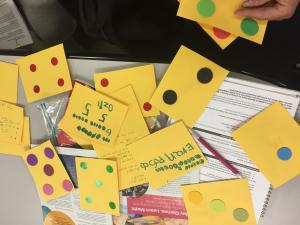 It was my pleasure this past winter to work with a group of educators who provide child care in their family homes. These small business owners met with me as a professional learning community, sharing our experiences and expertise with teaching math and science concepts to young children, from infancy to age 4.
It was my pleasure this past winter to work with a group of educators who provide child care in their family homes. These small business owners met with me as a professional learning community, sharing our experiences and expertise with teaching math and science concepts to young children, from infancy to age 4.
As the facilitator for this Virginia Quality program I was responsible for writing up a syllabus for our eight meetings over 5 months and creating an initial resource list. I included the following resources but this is not the entire syllabus or an exhaustive list.
Online resources for early childhood curriculum and activities in science and mathematics:
~Education Development Center (EDC), Young Mathematicians (YM)
- Math games designed for children ages 3 to 6-years-old. New resources have been added that include “At School” and “At Home” game directions, http://youngmathematicians.edc.org/games/ . The “At Home” game directions are family friendly with less text and include games to play with your fingers, card games, and board games, including an example video of a 3-year-old playing a dot card game at home.
- Printable math mini-books for families. Each math mini-book corresponds with a math game. http://ym.edc.org/math-books/mini-books/
~Erikson Institute’s Early Math Collaborative.
- Big Ideas: the key math concepts young children need to explore between the ages of 3 and 6. https://earlymath.erikson.edu/why-early-math-everyday-math/big-ideas-learning-early-mathematics/
- Big Ideas of Early Mathematics: What Teachers of Young Children Need to Know (Practical Resources in ECE) by the Erikson Institute Early Math Collaborative http://www.mypearsonstore.com/bookstore/big-ideas-of-early-mathematics-what-teachers-of-young-0132946971
- The Math in Ten Using a Grid Game. July 25, 2017. Video – for Pre-K and Kindergarten about grid games—an early introduction to board games. They are inherently mathematical, simple to make, easy to organize, but also customizable to children’s interests. https://earlymath.erikson.edu/the-math-in-ten-using-a-grid-game/
- Value of Blocks in Kindergarten video. August 25, 2016. A kindergarten teacher makes a strong case for how time spent playing with blocks supports mathematical thinking and learning in her classroom. Shape attributes, composition/decomposition, and the concepts of unit and equivalence are all important topics in the Common Core State Standards. Unit blocks are a powerful and developmentally-appropriate tool for young children to explore these ideas and deepen their understanding. https://earlymath.erikson.edu/value-blocks-kindergarten-2/
- Children’s books recommended by the Erikson Institute Early Math Collaborative, https://earlymath.erikson.edu/series/book-ideas/
~Peep and the Big Wide World Science Curriculum, WGBH and 9 Story Entertainment in association with TV Onterio & the National Science Foundation. http://peepandthebigwideworld.com/en/educators/ The videos of children engaging in science activities in real classrooms and family home child care programs portray realistic learning opportunities.
~The Iowa Regents’ Center for Cultivating Curiosity and Creativity in Early Education in STEM (CeeSTEM) Ramps and Pathways pages https://regentsctr.uni.edu/ramps-pathways includes videos specific to the activity of objects on inclined planes (ramps) https://regentsctr.uni.edu/ramps-pathways/media-center to illustrate the areas of learning. http://www.uni.edu/rampsandpathways/ Videos https://regentsctr.uni.edu/epq/all-videos of children working in an early childhood setting list relevant standards. The professional development section https://regentsctr.uni.edu/ceestem/professional-development includes pages for STEM Experiences for Classrooms, Recipes, and Games.
~Science, Technology, Engineering, and Mathematics (STEM) in Early Learning Series. This 11-part series offers research, practical application for classroom and home and provides examples of experiences that build scientific, technology, engineering, and mathematical learning for older toddlers and preschool children. From the Preschool Development Grant, US Dept of Education. https://pdg.grads360.org/#program/stem-in-early-childhood
On choosing activities to implement:
~An article by members of the NAEYC Early Childhood Science Interest Forum with reflective questions to consider in planning science activities: To Pin or Not to Pin? Choosing, Using, and Sharing High-Quality STEM Resources; free in Young Children, 74(3): 79-85. https://www.naeyc.org/resources/pubs/yc/jul2019/high-quality-stem-resources
About the nature of science:
~Understanding Science 101, “fun, accessible, and free resource…accurately communicates what science is and how it really works.” http://undsci.berkeley.edu/article/intro_01
About early childhood science education:
~Early Childhood Research and Practice, Collected Papers from the SEED (STEM in Early Education and Development) Conference, 2010. http://ecrp.uiuc.edu/beyond/seed/index.html
~Lab Out Loud, Karen Worth Episode 108 – Science in Early Childhood Education, February 23, 2014. http://laboutloud.com/2014/02/episode-108-science-in-early-childhood-education/
Science standards:
~Next Generation Science Standards for K-12 science education: For states, by states. 2013. NGSS Lead States. http://www.nextgenscience.org/next-generation-science-standards
Position statements:
~The National Association for the Education of Young Children (NAEYC) position statements. http://www.naeyc.org/positionstatements
~Early Childhood Mathematics: Promoting Good Beginnings. http://www.naeyc.org/files/naeyc/file/positions/psmath.pdf This joint position statement of the National Association for the Education of Young Children (NAEYC) and the National Council of Teachers of Mathematics (NCTM) highlights a set of principles for effective early math instruction.
~The National Science Teaching Association’s (NSTA) position statement on Early Childhood Science Education—endorsed by the NAEYC. (2014). http://www.nsta.org/about/positions/earlychildhood.aspx
Playing math games for older children and adults helped us understand what it feels like to be challenged and to persist—as well as an opportunity to exercise our social-emotional skills and executive functioning : ).
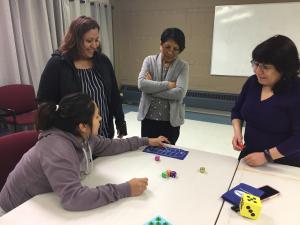
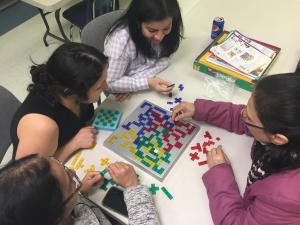
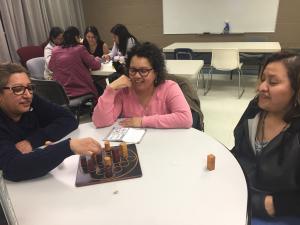
Additional math resources:
Help Your Child Develop Early Math Skills, Zero to Three newsletter.Feb 25, 2016. https://www.zerotothree.org/resources/299-help-your-child-develop-early-math-skills
Play Games, Learn Math! Explore Numbers and Counting with Dot Card and Finger Games by Kristen E. Reed and Jessica Mercer Young in Teaching Young Children (October/November 2017, Vol. 11, No. 1) https://www.naeyc.org/resources/pubs/tyc/oct2017/play-games-learn-math-explore-numbers
Mathematizing with Toddlers and Coaching Undergraduates: Foundations for Intentional Math Development by Julia Luckenbill. Young Children / July 2018 Vol. 73, No. 3. https://www.naeyc.org/resources/pubs/yc/jul2018/joys-benefits-math-based-books-language
Rocking and Rolling. Exploring Math with Infants and Toddlers: The Joys and Benefits of Math-Based Books and Language by Rebecca Parkakian, ZERO TO THREE. Young Children, July 2018 Vol. 73, No. 3. https://www.naeyc.org/resources/pubs/yc/jul2018/joys-benefits-math-based-books-language
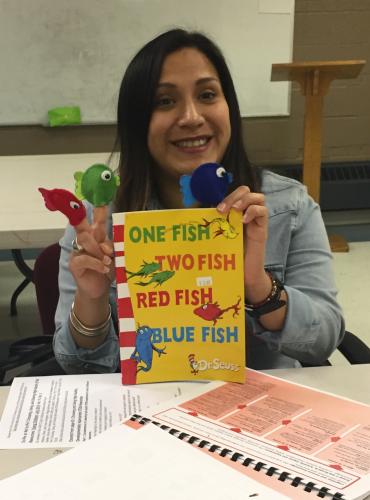
Reading with puppets
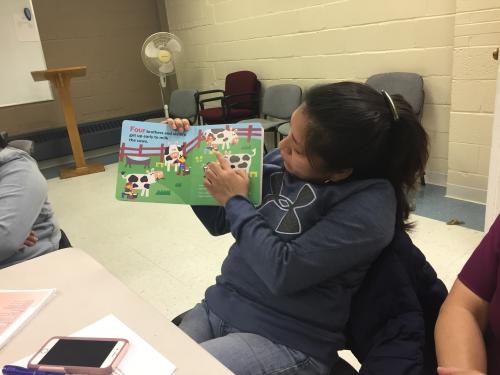
Reading, relating to prior knowledge, and counting
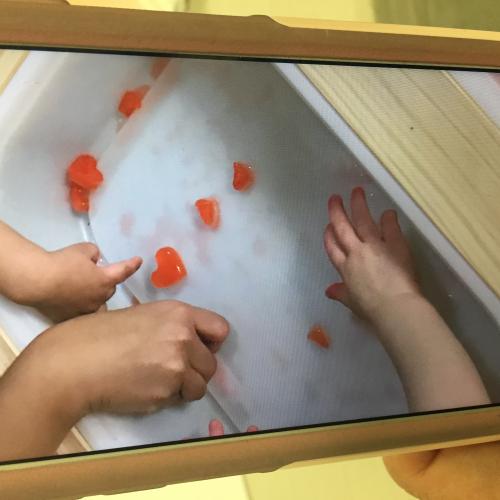
Floating different sizes and amounts of ice cubes engaged children in counting and the properties of water.
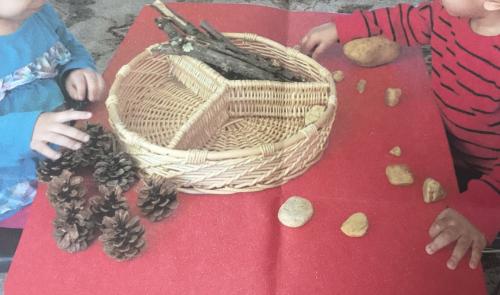
Natural materials with various textures for sorting and counting.
The professional learning community shared our homemade games and discussed how we adapted the above resources for infants and older children. Family child care providers are educators who are continually upping their understanding of children’s learning and learning new ways to teach science and math concepts.


